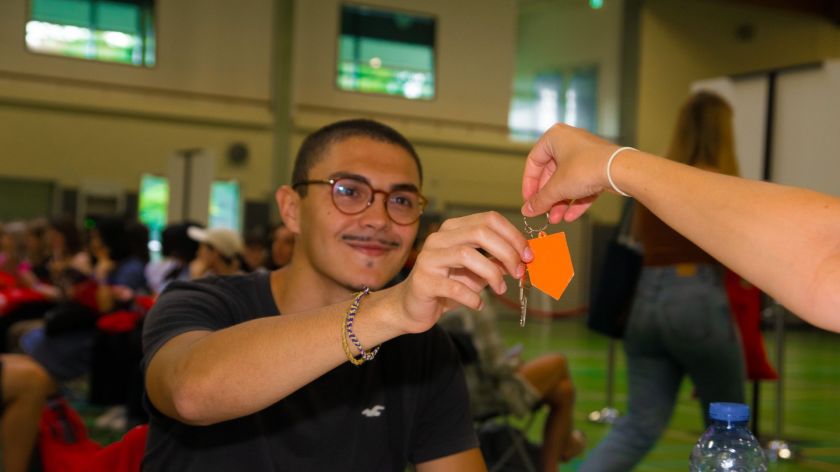Internationals to remain welcome in Nijmegen (if they find a room)
-
 Een internationale student krijgt een kamersleutel overhandigd. Foto: Diede van der Vleuten
Een internationale student krijgt een kamersleutel overhandigd. Foto: Diede van der Vleuten
Robbert Dijkgraaf, the minister of Education, wants to limit the flow of international students into the Netherlands. But according to a spokesperson for the Executive Board, Radboud University will continue to welcome international students. However, they will have to see to their own housing.
Too many internationals? According to a spokesperson for Radboud University, that is definitely not the case in Nijmegen.
But differing voices are rising in The Hague. It came out at the end of April that minister for Education Robbert Dijkgraaf (D66) wants to better control the influx of international students going forward. There should be a central authority for managing international students, and all international students should learn Dutch, Dijkgraaf wrote in a letter to parliament. The letter’s intent was to help prevent friction in higher education as a result of a large inflow of international students.
But it appears that Dijkgraaf’s letter has so far had little effect on Nijmegen’s university. Nationally, roughly 40 percent of first-year students come from abroad, but at Radboud University they only amount to 11 percent. According to the spokesperson, those 11 percent contribute to the quality of education. ‘In the interest of both Dutch and international students, we value a healthy international classroom (a mix of Dutch and international students in the lecture halls, ed.).’
As stated by the spokesperson, Radboud University is in talks with the ministry and MPs, along with other Dutch universities.
Brake and gas pedal
In the letter, Dijkgraaf writes that some study programmes need to ‘step on the gas, while others should pump the brakes when it comes to admitting internationals.’ According to the spokesperson for Radboud University, it is very hard to say to which programmes this would apply. He does go on to state that it is important for programmes with a pronounced international component—such as International and European Law—to have a healthy mix between Dutch and international students.
Dijkgraaf’s letter also notes that universities and colleges should support international students in learning Dutch. It is unclear what the desired proficiency level is: A1, B1, or C1. ‘The minister’s ambitions are very general and raise a lot of questions’, as stated by the spokesperson. The university already administers language tests to all students to gauge their proficiency and also provides courses for improving it.
However, things may not be set in stone just yet for Radboud University. According to Dijkgraaf, exceptions may be made for universities in so-called border areas, such as Maastricht University, Twente University, and Radboud University. Due to their locations, some of the international students come from the surrounding regions. It is not yet clear if those exceptions are forthcoming, nor what they would entail. ‘We await the minister’s detailing’, according to the spokesperson.
Housing crisis
Although the discourse from The Hague has turned the past few months, it has not yet led to major panic among Nijmegen internationals. One major issue, however, is the lack of availability of student housing. Due to the housing crisis, there is a severe lack of living space and student rooms, which affects both Dutch and international students. That is why internationals who are not from the region are advised to find a place to live before they come to Nijmegen—otherwise, they are recommended to refrain from coming.
One important detail: The university will be adapting its policy concerning room mediation, starting in the academic year 2024-2025. However, the University will continue to support master’s and exchange students for the nominal duration of their studies. ‘BA students are ineligible for this support, due to the insufficient number of rooms, coupled with the short-stay rental’s maximum duration being two years’, according to the spokesperson. ‘We will point them to the many options for finding a room that are available—as we do for our Dutch students—but we will no longer mediate those rentals.’
Translated by Jasper Pesch




Hub Nijssen schreef op 6 juni 2023 om 13:28
The average of 40% international student is totally nonsense, due to the definition of the CBS which excludes everybody who already acquired a diploma in the NL. This means, all Dutch students who did their Bachelor’s in the NL, are excluded. The Minister however, has to play it more political. He mentions in the next sentence that there are sources doubting the 40% etc. Nuffic (which belongs to the Ministry) has published a report with the correct numbers and percentages. https://www.nuffic.nl/en/publications/incoming-degree-mobility-in-dutch-higher-education-2022-23 It would have been a good thing, if the VOX team would have mentioned this too. Only Maastricht University has a population of more than 40% internationals. And that from its beginning in the 1970s on. There are only a few programmes with this high % of internationals, like Psychology and IT. So, the problem can be solved in an other way than this harsh ban on international recruitment.
About the housing: we all know that this is not a nice solution. It will be tough for the bachelors. We discussed this for almost a year. We are discussing more housing on campus and also near to railway stations in the neighbourhood. However, that will take some time.